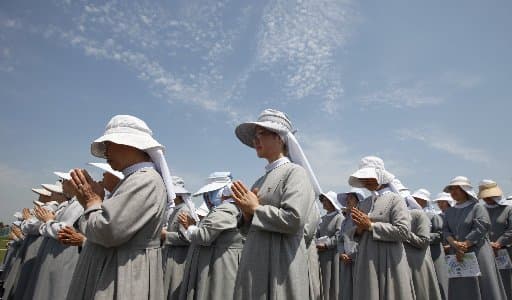WASHINGTON, D.C. — South Korean Catholic leaders will be part of a 40-member delegation that will meet with U.S. bishops and government representatives in early October to explore ways to build closer relations with North Korea.
The Oct. 5-6 peace conference at The Catholic University of America is the sixth in an annual series and the first on U.S. soil since 2017.
Conference planners told Catholic News Service their hope is to overcome some of the deep distrust of the North in the hope of establishing new lines of communication, opening pathways for wider delivery of humanitarian aid, fostering regular opportunities for family reunions, and eventually reversing widespread human rights abuses.
“The idea is to expand the options (for peace),” said Maryann Cusimano Love, associate professor of international relations at The Catholic University of America.
“There have been very few policies given much consideration (in the United States), primarily military options and sanctions, and they haven’t been working. The idea that you keep doing the same thing and expect different results is what this delegation intends to question,” Cusimano Love said.
The issues the conference will explore have been around for decades. Among the most apparent is the separation of families. While there have been short periods when families could cross the most highly militarized border in the world, no consistent policy allowing longer intervals of family reunification exists.
South Korea’s new government opened the door to the possibility of resuming reunions of long-separated families Sept. 8 by proposing a meeting with North Korea. Such reunions are seen as a humanitarian issue, because many of those who have been separated are aging and desperately want to reunite with relatives before they die.
Technically, the three-year war that led to the division of Korea into North and South has never ended. Military fighting terminated with the signing of an armistice July 27, 1953, but no formal peace agreement exists between North Korea and South Korea.
Underlying the questions the conference will address is North Korea’s nuclear weapons program. Given North Korean leader Kim Jong-un’s stance that he has no intention to reverse its development of such weapons, tensions are continuing to rise in the region.
“North Korea sees nuclear weapons as their ticket to guaranteeing security,” said Andrew Yeo, professor of politics and director of Asian studies at The Catholic University of America. “Most policymakers wouldn’t care about North Korea if they didn’t have nuclear weapons.”
He said the last meaningful engagement between the two nations occurred in 2019. The COVID-19 pandemic that began in 2020 led to a self-imposed lockdown of North Korea that has restricted efforts to bridge the divide that exists.
He credited Korean Catholic leaders for “always looking for avenues of engagement” and for making clear that “isolating North Korea is not going to get us anywhere and that, most likely, it’s going to make the situation worse.”
The peace conference emerged within the Catholic Institute of Northeast Asia Peace, founded by Bishop Peter Lee Ki-heon of Uijeongbu, South Korea, chairman of the Korean bishops’ Committee for the Reconciliation of the Korean People.
Love said the institute, known as CINAP, is attempting to “build more constituents for peace.”
This year’s conference will include a pair of sessions examining ways to advance peace on the Korean peninsula. One session will include a review of the 2015 visit by South Korean bishops to the North and subsequent efforts to engage North Korea.
Beyond the formal program, the most important message-sharing will occur as members of the Korean delegation meet with U.S. officials at the State Department, the National Security Council and on Capitol Hill.
Archbishop Timothy P. Broglio of the U.S. Archdiocese for the Military Services, past chairman of the U.S. bishops’ Committee on International Justice and Peace, will accompany the Koreans during the meetings. Also joining them will be Bishop David J. Malloy of Rockford, Illinois, current chairman, and Bishop Frank J. Dewane of Venice, Florida, a committee member.
The face-to-face encounters will allow church leaders to impress upon U.S. policymakers their views for alternatives beyond military-first options and economic sanctions against North Korea.
“I hope the message comes out that some initiative for peace is possible,” Broglio told CNS.
The archbishop, who will join one of the panel discussions, said dialogue is important to pursue with North Korea, and he hopes the U.S. government will hear that message from the Korean representatives.
“It’s clear that new ideas are necessary. If in some way or another we (U.S. bishops) can be the vehicle that opens other possibilities, well, then I think that’s a very positive thing,” said Broglio, who has visited South Korea numerous times.
Still, he expressed that caution is necessary in dealing with Kim, saying that “while we’d like to see peace happen,” it’s important for both North and South to agree on the substantive steps to take.
“I don’t have a great deal of information about the willingness of the North to do that,” he said.
Jesuit Father Dennis McNamara, the Park professor of sociology and Korean studies at Georgetown University, said solutions to the issues confronting South Korea and North Korea will be difficult to achieve, but not impossible.
He will join the conference to offer suggestions on how to broach the divide between the two nations. McNamara also suggested that it may be “civic diplomacy” by leaders within the Catholic Church, universities and nongovernmental organizations that guide the way to improved cross-border relations.
“Peace building is what we are looking for,” the priest said. “The conference can become something of a model for peace building. Specifically, the real significance is getting the U.S. involved on the North Korean issue without the military running the process.
“For the State Department, this is a boon,” he added. “They’re getting a dialogue in which they don’t have to be running the dialogue. I think that’s very important.”











